2022届高考英语二轮复习:语法(倒装、强调句)课件(35张)
文档属性
| 名称 | 2022届高考英语二轮复习:语法(倒装、强调句)课件(35张) | 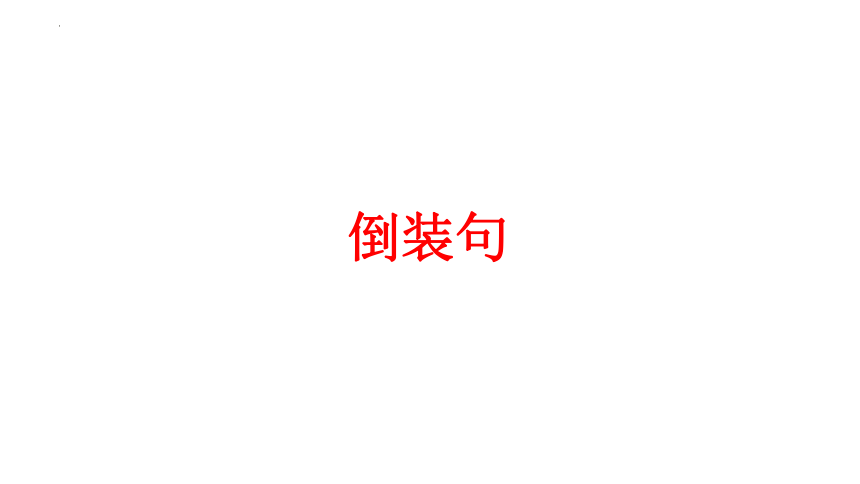 | |
| 格式 | pptx | ||
| 文件大小 | 101.3KB | ||
| 资源类型 | 教案 | ||
| 版本资源 | 通用版 | ||
| 科目 | 英语 | ||
| 更新时间 | 2022-03-04 19:07:32 | ||
图片预览

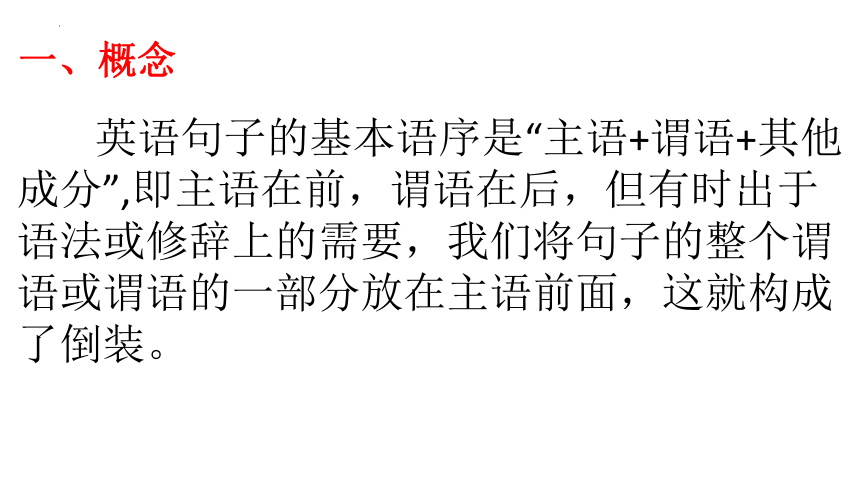
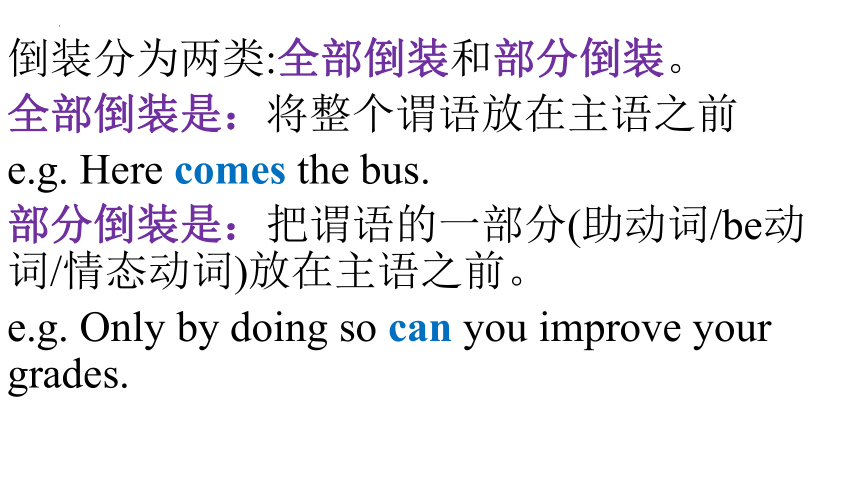
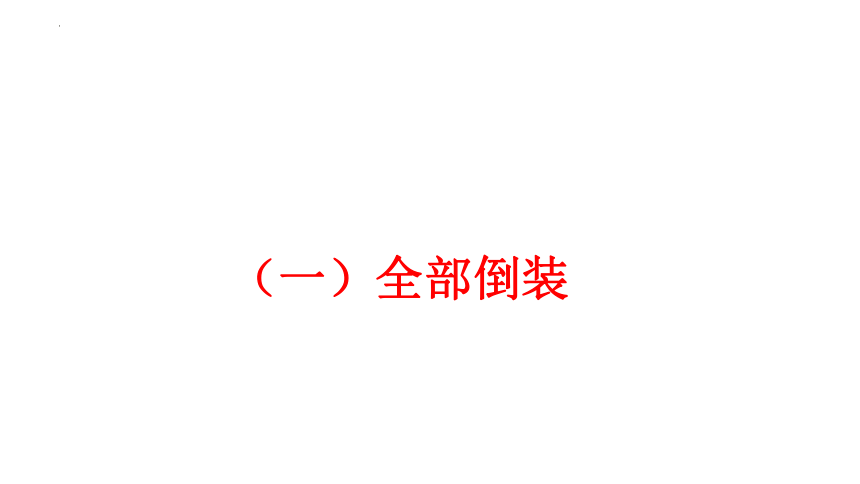
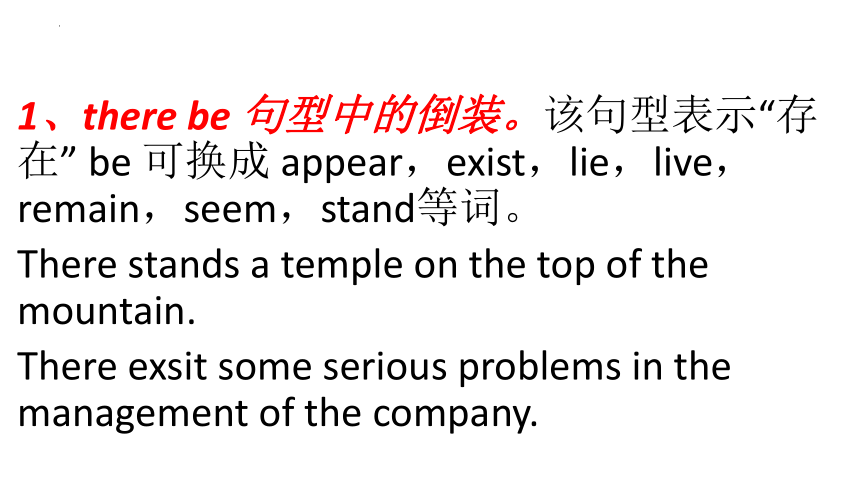
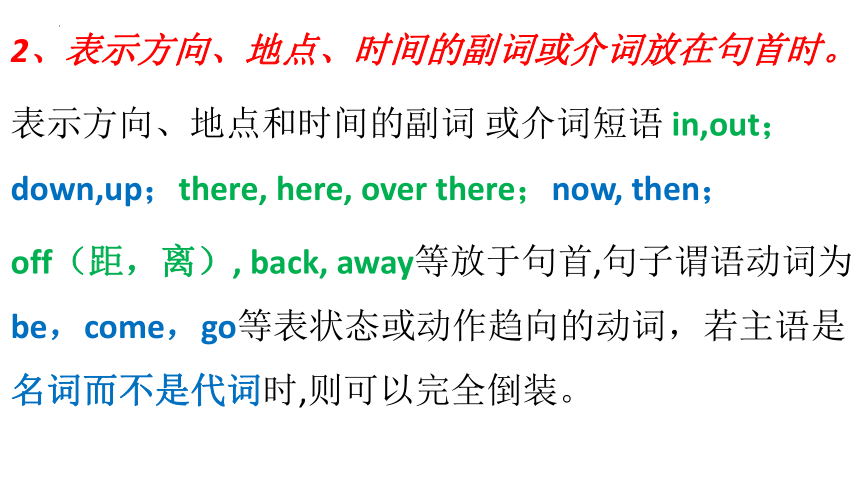
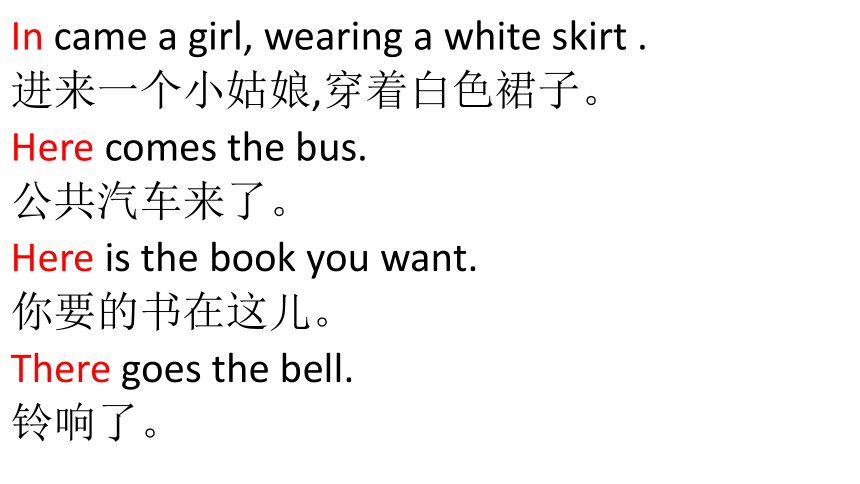

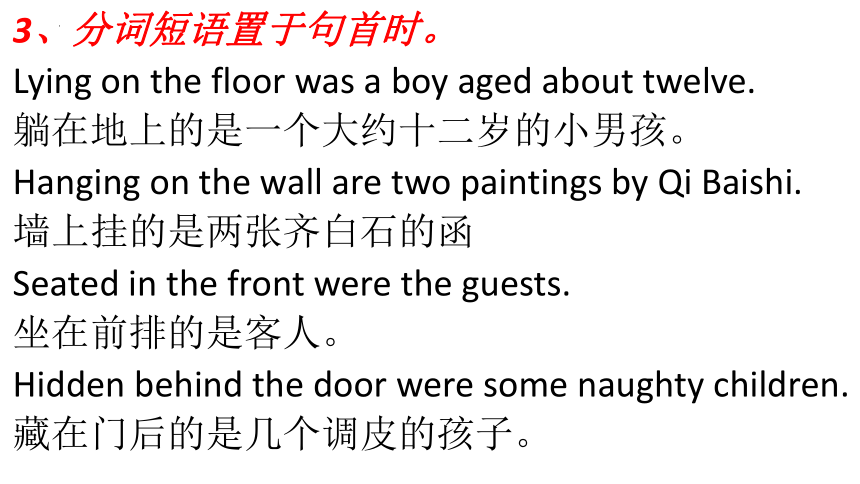
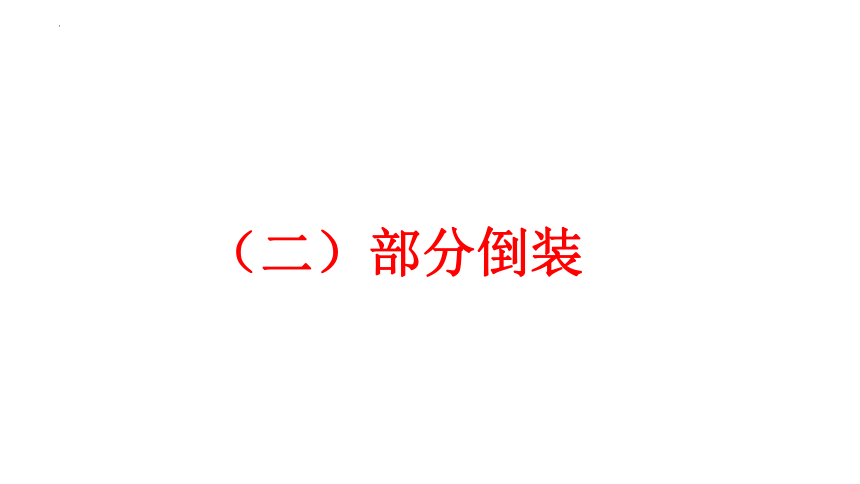
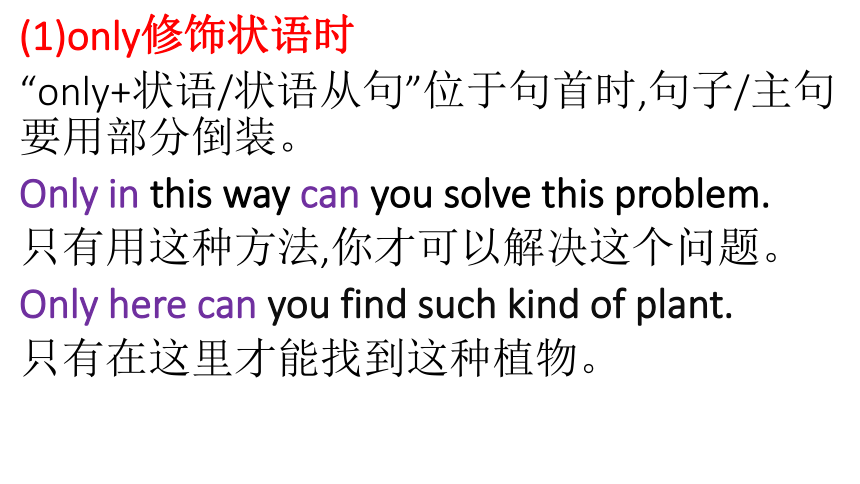
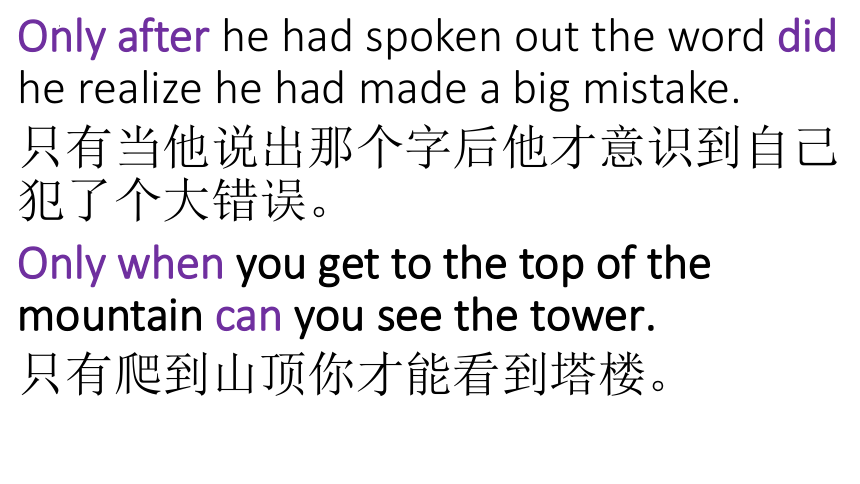
文档简介
(共35张PPT)
倒装句
一、概念
英语句子的基本语序是“主语+谓语+其他成分”,即主语在前,谓语在后,但有时出于语法或修辞上的需要,我们将句子的整个谓语或谓语的一部分放在主语前面,这就构成了倒装。
倒装分为两类:全部倒装和部分倒装。
全部倒装是:将整个谓语放在主语之前
e.g. Here comes the bus.
部分倒装是:把谓语的一部分(助动词/be动词/情态动词)放在主语之前。
e.g. Only by doing so can you improve your grades.
(一)全部倒装
1、there be 句型中的倒装。该句型表示“存在” be 可换成 appear,exist,lie,live,remain,seem,stand等词。
There stands a temple on the top of the mountain.
There exsit some serious problems in the management of the company.
2、表示方向、地点、时间的副词或介词放在句首时。
表示方向、地点和时间的副词 或介词短语 in,out;down,up;there, here, over there;now, then;
off(距,离), back, away等放于句首,句子谓语动词为be,come,go等表状态或动作趋向的动词,若主语是名词而不是代词时,则可以完全倒装。
In came a girl, wearing a white skirt .
进来一个小姑娘,穿着白色裙子。
Here comes the bus.
公共汽车来了。
Here is the book you want.
你要的书在这儿。
There goes the bell.
铃响了。
Down come all of you.
你们都下来。
Now comes your turn.
现在轮到你了。
After the head followed a group of workers.
头儿后面跟着一群工人。
On the desk lie piles of books.
书桌上有几堆书。
3、分词短语置于句首时。
Lying on the floor was a boy aged about twelve.
躺在地上的是一个大约十二岁的小男孩。
Hanging on the wall are two paintings by Qi Baishi.
墙上挂的是两张齐白石的函
Seated in the front were the guests.
坐在前排的是客人。
Hidden behind the door were some naughty children.
藏在门后的是几个调皮的孩子。
(二)部分倒装
(1)only修饰状语时
“only+状语/状语从句”位于句首时,句子/主句要用部分倒装。
Only in this way can you solve this problem.
只有用这种方法,你才可以解决这个问题。
Only here can you find such kind of plant.
只有在这里才能找到这种植物。
Only after he had spoken out the word did he realize he had made a big mistake.
只有当他说出那个字后他才意识到自己犯了个大错误。
Only when you get to the top of the mountain can you see the tower.
只有爬到山顶你才能看到塔楼。
(2)表示否定意义的词或短语放在句首时
此类词或短语主要有not, little, hardly, never, at no time(决不), by no means, on no condition, in no case, in no event, nowhere(无处,哪里都不), seldom等。
Seldom do I go to work by bus.
我很少乘公共汽车上班
Never shall I do the same thing again.
我再也不做同样的事情了。
At no time does the plain look so perfect as in early autumn.
平原看上去从没像初秋时这么完美。
Nowhere can I find the book.
到处都找不到这本书。
(3)某些含有否定词的连词位于句首时
not only...but(also)连接接两个并列句时,含有 not only的句子用部分倒装;
hardly...when, no sooner...than,(一...就...)not... until引导的句子, hardly, no sooner,not until位于句首时,主句用部分倒装。
Not only do I come to school early, but (also) my teacher does.
不但我到 校早,而且我的老师也来得很早。
No sooner had the game started than it began to rain heavily.
比赛刚开始,天就下起了大雨。
Hardly had she gone out when a student came to visit her.
她刚出门就有一个学生来看望她。
Not until the teacher came in did the students stop talking.
直到老师进来学生们才停止讲话。
(4)表示“也(不)……”的句式
表示一种情况适用于两者或一者同时具备两种情况时可用“so/ neither/nor+助动词/情态动词/be+主语”倒装形式。
My father is a teacher and so is my mother.
我父亲是教师,我妈妈也是教师。
She has been to New York and so have I.
她去过纽约,我也去过。
- Susie can' t answer the question.
苏茜回答不上这个问题。
Neither/Nor can Peter.
彼得也回答不上来。
(5)if 引导的虚拟语气的句子中,如果省略if 需倒装。
e.g. Were I you, I would work hard.
如果我是你,我会努力工作。
Had you told me earlier, I would have offered some help.
如果你早点告诉我,我早就提供了一些帮助。
(6). so...that 和 such...that 句式中, so 或 such 及所修饰的部分位于句首时,主句部分倒装。
e.g. So clever is he that everyone likes him.
Such great progress did he make that he won much respect.
强调句
强调是人们为了对一定语境下的部分内容进行突出强调而采用的一种修辞手法。强调主要是为了突出信息。有些是语法上的需要,有时是意义上的需要。
英语中的强调主要有
It is/was...that/who...
What..is/was...
do/does/did+动词原形”等结构。
(一) It is/was...that/who... 强调
这种句型可以强调句子的主语、宾语和状语
Jane has been living In London since she left
China.
强调主语
It is Jane that/ who has been living in London since she left China.
强调地点状语
It is in London that Jane has been living since she left China.
强调时间状语
It is since she left China that Jane has been living in London.
强调句式的一般疑问句是“Is/ Was it十被强调部分+that/who... ”
Was it Sally that phoned just now?
强调句式的特殊疑问句是“特殊疑问词+is/was+ it that... ”特殊疑问句中只有疑问词可以被强调。
Who was it that phoned just now
刚才打电话的究竟是谁?
When was it that you lost your luggage
你究竟是什么时候丢的行李
Where was it that Shakespeare was born
莎士比亚出生的地方究竟在哪里
(二) What...is/was... 强调
What I am going to tell you is that you take first place in the game.
我想要告诉你的是你在比赛中获得了第一名。
What I should do next is (to)get in touch with the manager.
我下一步要做的就是与经理取得联系。
(三)“do/ does/did+动词原形”强调
do,does,did只能对谓语进行强调,且只能用于一般现在时和一般过去时的肯句式中
He does know the place well.
他的确很熟悉这个地方。
Do write to me when you get there.
你到那里后务必给我来信。
He did phone you yesterday.
他作天的确给你打过电话。
其他形式的强调:
1、倒装强调
2、感叹句强调
3、on earth, in the world(究竟)强调
What on earth is the matter there?
4、very,only ,single 强调
That's the very textbook we used last term.
On the table were some flowers.
How interesting a story it is!
5、at all 强调
at all 作“完全,根本”讲,多用于否定句和条件句
作“真的,确实” 讲,多用于肯定句和疑问句
If it were not for the sun, we could not live at all。
如果没有太阳,我们根本不能生存。
Do you feel ill at all
你真的感觉不舒服吗
改错:
1、It was at the school gate where we gave the foreign visitors a warm welcome.
2、I do call her last night, but the line was busy then.
3、Only in this way you make great progress in your English study.
____
that
__
did
can
4、David has made great progress recently and so you.
5、It is his brother that are to blame for the accident.
have
---
is
将下列句子改为倒装句
1、It was not until the early years of the 19th century that man knew what heat was.
Not until the early years of the 19th century did man know what heat was.
2、He was able to get back to work only when the war was over.
Only when the war was over was he able to get back to work.
3、He not only liked reading stories, but he also could even write some.
Not only did he like reading stories but he also could even write some.
4、The boy seldom read newspaper.
Seldom did the boy read newspaper.
5、She did not see the importance of learning English until she failed to find a job.
Not until she failed to find a job did she see the importance of learning English.
6、If you don’t attend the lecture, I shall not attend it, either.
If you don't attend the lecture, neither/nor shall I.
倒装句
一、概念
英语句子的基本语序是“主语+谓语+其他成分”,即主语在前,谓语在后,但有时出于语法或修辞上的需要,我们将句子的整个谓语或谓语的一部分放在主语前面,这就构成了倒装。
倒装分为两类:全部倒装和部分倒装。
全部倒装是:将整个谓语放在主语之前
e.g. Here comes the bus.
部分倒装是:把谓语的一部分(助动词/be动词/情态动词)放在主语之前。
e.g. Only by doing so can you improve your grades.
(一)全部倒装
1、there be 句型中的倒装。该句型表示“存在” be 可换成 appear,exist,lie,live,remain,seem,stand等词。
There stands a temple on the top of the mountain.
There exsit some serious problems in the management of the company.
2、表示方向、地点、时间的副词或介词放在句首时。
表示方向、地点和时间的副词 或介词短语 in,out;down,up;there, here, over there;now, then;
off(距,离), back, away等放于句首,句子谓语动词为be,come,go等表状态或动作趋向的动词,若主语是名词而不是代词时,则可以完全倒装。
In came a girl, wearing a white skirt .
进来一个小姑娘,穿着白色裙子。
Here comes the bus.
公共汽车来了。
Here is the book you want.
你要的书在这儿。
There goes the bell.
铃响了。
Down come all of you.
你们都下来。
Now comes your turn.
现在轮到你了。
After the head followed a group of workers.
头儿后面跟着一群工人。
On the desk lie piles of books.
书桌上有几堆书。
3、分词短语置于句首时。
Lying on the floor was a boy aged about twelve.
躺在地上的是一个大约十二岁的小男孩。
Hanging on the wall are two paintings by Qi Baishi.
墙上挂的是两张齐白石的函
Seated in the front were the guests.
坐在前排的是客人。
Hidden behind the door were some naughty children.
藏在门后的是几个调皮的孩子。
(二)部分倒装
(1)only修饰状语时
“only+状语/状语从句”位于句首时,句子/主句要用部分倒装。
Only in this way can you solve this problem.
只有用这种方法,你才可以解决这个问题。
Only here can you find such kind of plant.
只有在这里才能找到这种植物。
Only after he had spoken out the word did he realize he had made a big mistake.
只有当他说出那个字后他才意识到自己犯了个大错误。
Only when you get to the top of the mountain can you see the tower.
只有爬到山顶你才能看到塔楼。
(2)表示否定意义的词或短语放在句首时
此类词或短语主要有not, little, hardly, never, at no time(决不), by no means, on no condition, in no case, in no event, nowhere(无处,哪里都不), seldom等。
Seldom do I go to work by bus.
我很少乘公共汽车上班
Never shall I do the same thing again.
我再也不做同样的事情了。
At no time does the plain look so perfect as in early autumn.
平原看上去从没像初秋时这么完美。
Nowhere can I find the book.
到处都找不到这本书。
(3)某些含有否定词的连词位于句首时
not only...but(also)连接接两个并列句时,含有 not only的句子用部分倒装;
hardly...when, no sooner...than,(一...就...)not... until引导的句子, hardly, no sooner,not until位于句首时,主句用部分倒装。
Not only do I come to school early, but (also) my teacher does.
不但我到 校早,而且我的老师也来得很早。
No sooner had the game started than it began to rain heavily.
比赛刚开始,天就下起了大雨。
Hardly had she gone out when a student came to visit her.
她刚出门就有一个学生来看望她。
Not until the teacher came in did the students stop talking.
直到老师进来学生们才停止讲话。
(4)表示“也(不)……”的句式
表示一种情况适用于两者或一者同时具备两种情况时可用“so/ neither/nor+助动词/情态动词/be+主语”倒装形式。
My father is a teacher and so is my mother.
我父亲是教师,我妈妈也是教师。
She has been to New York and so have I.
她去过纽约,我也去过。
- Susie can' t answer the question.
苏茜回答不上这个问题。
Neither/Nor can Peter.
彼得也回答不上来。
(5)if 引导的虚拟语气的句子中,如果省略if 需倒装。
e.g. Were I you, I would work hard.
如果我是你,我会努力工作。
Had you told me earlier, I would have offered some help.
如果你早点告诉我,我早就提供了一些帮助。
(6). so...that 和 such...that 句式中, so 或 such 及所修饰的部分位于句首时,主句部分倒装。
e.g. So clever is he that everyone likes him.
Such great progress did he make that he won much respect.
强调句
强调是人们为了对一定语境下的部分内容进行突出强调而采用的一种修辞手法。强调主要是为了突出信息。有些是语法上的需要,有时是意义上的需要。
英语中的强调主要有
It is/was...that/who...
What..is/was...
do/does/did+动词原形”等结构。
(一) It is/was...that/who... 强调
这种句型可以强调句子的主语、宾语和状语
Jane has been living In London since she left
China.
强调主语
It is Jane that/ who has been living in London since she left China.
强调地点状语
It is in London that Jane has been living since she left China.
强调时间状语
It is since she left China that Jane has been living in London.
强调句式的一般疑问句是“Is/ Was it十被强调部分+that/who... ”
Was it Sally that phoned just now?
强调句式的特殊疑问句是“特殊疑问词+is/was+ it that... ”特殊疑问句中只有疑问词可以被强调。
Who was it that phoned just now
刚才打电话的究竟是谁?
When was it that you lost your luggage
你究竟是什么时候丢的行李
Where was it that Shakespeare was born
莎士比亚出生的地方究竟在哪里
(二) What...is/was... 强调
What I am going to tell you is that you take first place in the game.
我想要告诉你的是你在比赛中获得了第一名。
What I should do next is (to)get in touch with the manager.
我下一步要做的就是与经理取得联系。
(三)“do/ does/did+动词原形”强调
do,does,did只能对谓语进行强调,且只能用于一般现在时和一般过去时的肯句式中
He does know the place well.
他的确很熟悉这个地方。
Do write to me when you get there.
你到那里后务必给我来信。
He did phone you yesterday.
他作天的确给你打过电话。
其他形式的强调:
1、倒装强调
2、感叹句强调
3、on earth, in the world(究竟)强调
What on earth is the matter there?
4、very,only ,single 强调
That's the very textbook we used last term.
On the table were some flowers.
How interesting a story it is!
5、at all 强调
at all 作“完全,根本”讲,多用于否定句和条件句
作“真的,确实” 讲,多用于肯定句和疑问句
If it were not for the sun, we could not live at all。
如果没有太阳,我们根本不能生存。
Do you feel ill at all
你真的感觉不舒服吗
改错:
1、It was at the school gate where we gave the foreign visitors a warm welcome.
2、I do call her last night, but the line was busy then.
3、Only in this way you make great progress in your English study.
____
that
__
did
can
4、David has made great progress recently and so you.
5、It is his brother that are to blame for the accident.
have
---
is
将下列句子改为倒装句
1、It was not until the early years of the 19th century that man knew what heat was.
Not until the early years of the 19th century did man know what heat was.
2、He was able to get back to work only when the war was over.
Only when the war was over was he able to get back to work.
3、He not only liked reading stories, but he also could even write some.
Not only did he like reading stories but he also could even write some.
4、The boy seldom read newspaper.
Seldom did the boy read newspaper.
5、She did not see the importance of learning English until she failed to find a job.
Not until she failed to find a job did she see the importance of learning English.
6、If you don’t attend the lecture, I shall not attend it, either.
If you don't attend the lecture, neither/nor shall I.
